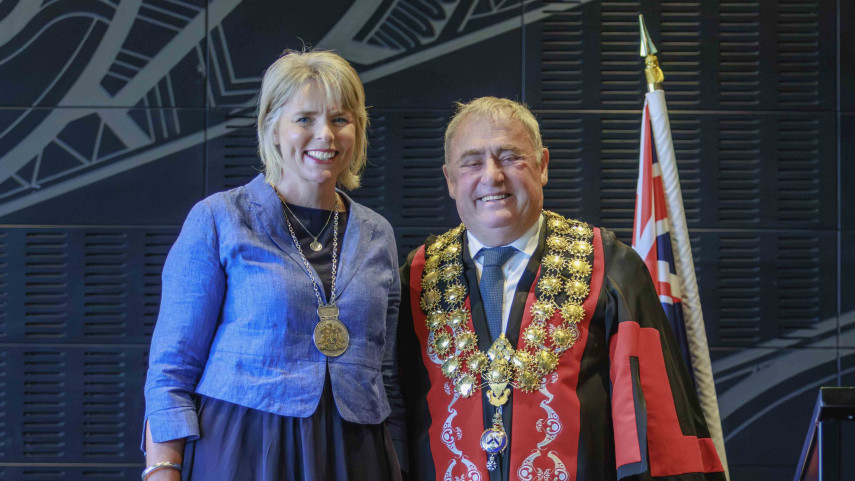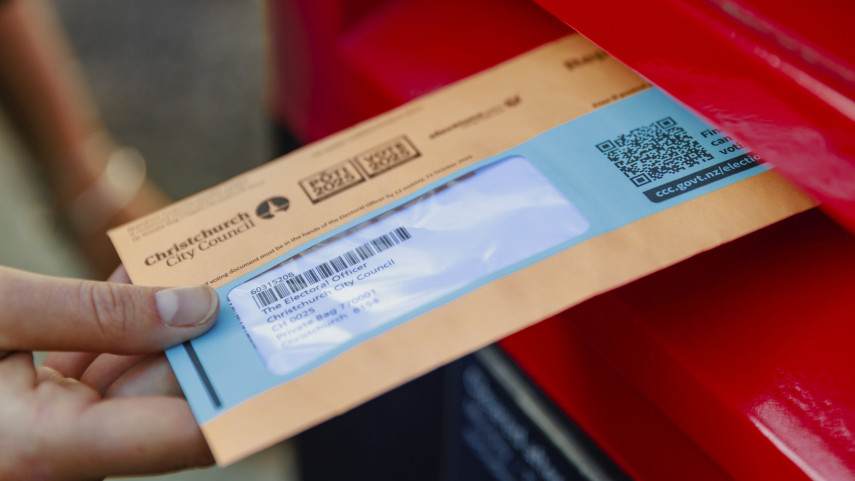Information and resources for candidates.

The Council elections were on Saturday 11 October 2025. Voting opened on Tuesday 9 September and closed at noon on Saturday 11 October 2025.
For any queries, contact the Elections Team by emailing elections@ccc.govt.nz, calling 03 941 8581 or in person on the ground floor at Te Hononga Civic Offices, 53 Hereford Street from 9am to 5pm, Monday to Friday.
Take a look at the 2025 candidate handbook [PDF, 20 MB] and the 2025 candidate information sheet [PDF, 147 KB].
The Pre-election Report provides an overview of the strategic, financial, and governance context that will shape Council decision-making over the next three years.
Read the report [PDF, 13 MB].
Developed to support informed participation in the democratic process, the report provides key insights for both prospective candidates and voters.
It outlines organisational priorities, financial performance and forecasts, major capital projects, and the key challenges facing Christchurch and Banks Peninsula. Read more on Newsline(external link)
Candidate resources for 2025:
- 2025 candidate return of donations and expenses [PDF, 300 KB]
- 2025 candidate handbook [PDF, 20 MB]
- 2025 candidate information sheet [PDF, 147 KB]
- 2025 elections signage information sheet [PDF, 145 KB]
- 2025 candidate social media guidelines [PDF, 89 KB]
- 2025 nominations and candidate profile statement information sheet [PDF, 191 KB]
2025 elected member protocols and Taituara pre-election communications guides:
- 2025 elected member protocols [PDF, 39 KB]
- 2025 Taituara pre-election communications guide [PDF, 678 KB]
Information for candidates is available on the Vote Local(external link) website. There is also useful candidate guidance available from:
- Candidates' guidance – Local Government New Zealand – LGNZ(external link)
- Candidate FAQs – Vote 25 | Pōti 25(external link)
If you have any questions, please contact the electoral officer on 021 498 517 or the deputy electoral officer on 03 941 8581, or via email at elections@ccc.govt.nz.
Find out about being a Christchurch City Council elected member.
- Find out when elected candidates are inducted, sworn in, and other key meetings early in the new term: Key post-election dates [PDF, 45 KB]
- Find out how the Council works: How the Council works : Christchurch City Council(external link)
- Go to a meeting: Upcoming meetings and hearings : Christchurch City Council(external link)
- Find out about our wards and Community Boards: Ward and Community Boards map : Christchurch City Council(external link)
- Check out the Community Board webpages: Community Boards : Christchurch City Council(external link)
- Watch the live streaming or recording of a Council meeting: Christchurch City Council Meetings(external link)
- Read minutes and agendas for Council, community board and committee meetings: Agendas and Minutes : Christchurch City Council(external link)
- Refer to these external resources available online: votelocal.co.nz/information-for-candidates(external link) and Candidates' guidance - Local Government New Zealand - LGNZ(external link)
Local Government New Zealand has released a series of free online learning experiences, so you can understand how a council works along with the reality of being an elected member.
The information includes animations and interactive modules covering the need-to-knows.
Potential candidates can learn about the structure of local government and roles within a council, how councils are funded, and what the role and life of an elected member looks like.
The Christchurch City Council candidate information session was held on 5 June.
At the session, our Chief Executive and Electoral Officer covered the elections process, the Council and representing your community.
The presentation is available online [PDF, 2.2 MB] and you can watch the session below.
Before you start your campaign, there are a few things you need to keep in mind.
Take a look at the 2025 candidate handbook [PDF, 20 MB] and the 2025 candidate information sheet [PDF, 145 KB].
All election advertising, using any medium, including social media, must identify the person under whose authority they have been produced, as per section 113 of the Local Electoral Act 2001. This requires an authorisation statement, clearly visible on any and all campaigning material, setting out:
- The true name of the person, persons or organisation at whose direction the signage has been erected.
- The contact details for that person/organisation:
- a residential or business address; or
- an email address; or
- a post office box number; or
- a phone number; or
- a link to an internet site (if the page contains one or more of the above).
Election campaigning within the rules can start at any time but should cease by the close of voting, noon on Saturday 11 October 2025.
Election signage is permitted within certain rules from nine weeks from the start of an election or by-election. For the 2025 elections, this is from Tuesday 8 July 2025. Signage must be removed by midnight on Friday 10 October 2025.
These rules are set by the Christchurch District Plan, Council and NZ Transport Agency Waka Kotahi bylaws. Please read the 2025 elections signage information fact sheet to ensure you are complying with the rules.
Council resources are not permitted to be used for campaigning purposes.
All candidates in elections and by-elections held under the provisions of the Local Electoral Act 2001 must file a return of electoral donations and expenses.
A candidate is required to keep a record of all electoral donations given and campaign election expenses and must submit a return to the electoral officer within 55 days of the election result being declared. This must be submitted on the return of donations and expenses form [PDF, 300 KB].
Once the electoral expenses and electoral donations return forms and supporting documents are sent back to the council they become public documents and will be placed on the council’s website and can be inspected by any person for the next seven years.
Campaign expenditure
Candidates have campaign expenditure limits and are required to file a return to the electoral officer after the election.
Section 111 of the Local Electoral Act 2001(external link) details the maximum amount of electoral expenses. The Candidate Information Booklet includes a summary from section 111(1) of the Act of the maximum amount of electoral expenses (inclusive of goods and services tax) that a candidate must not exceed.
Campaign expenditure is all expenses relating to the campaign from the period three months before election day, for 2025 this is 11 July 2025, plus any apportioned costs of any election campaigning that started before the three-month period. Refer to section 112 of the Local Electoral Act 2001(external link).
If a candidate is standing for more than one position (for example mayor and councillor), then the higher limit applies (not both combined).
The relevant sections of the Local Electoral Act 2001 on election expenses are available in the Candidate Information Booklet. Please note:
- Candidates are required to keep evidence of any election expenses for amounts exceeding $200.
- All candidates must submit a return of election expenses and donations form even if no expenses have been incurred or donations received.
- The $200 nomination deposit fee is not an electoral expense.
Electoral donations
Candidates should note the following with regard to electoral donations:
An electoral donation is a donation of money, goods or services that is made for use in a candidate’s electoral campaign (section 103A of the Local Electoral Act). An electoral donation given at any time, including in advance of a candidate submitting a nomination, must be recorded.
Electoral donations and contributions to donations of more than $1500, including GST, are required to be declared in the candidate’s return of electoral expenses and donations. A series of donations made by one person that adds up to more than $1500 must also be declared.
An electoral donation includes:
- Where a candidate is provided with goods or services free of charge that have a reasonable market value greater than $300.
- Where a candidate is provided with discounted goods or services and the reasonable market value of the goods or services is greater than $300, the difference between the contract or agreed price and the reasonable market value of those goods and services is a donation.
- Where a candidate sells over-valued goods or services, the difference between the price paid and the reasonable market value is a donation, for example, a funding-raising auction or dinner.
Donations to candidates can be made up of pooled funds contributed by more than one person (referred to as donations funded from contributions). These types of donations include, for example, campaign donations made through a trust, or where there is a fundraising collection for a candidate’s campaign.
Candidates must disclose, in their return of electoral donations and expenses, whether a donation is funded from contributions and the name and address of any individuals contributing amounts in excess of $1500. Anonymous donations made through contributions are limited to a maximum of $1500 per donation.
Candidates who receive an anonymous donation of more than $1500 are required to pay the amount over $1500 to the electoral officer (for payment into the Council’s general account).
The electoral officer’s role is to bring these matters to the attention of all candidates.
Christchurch and Banks Peninsula have 16 wards and six community boards, each representing a different area around the city.
Council publishes information requested by candidates in the lead-up to the local body elections.
This allows Council information to be available to all candidates on an equal basis.
26 September 2025
- Barbadoes Street concerns and recommendations [PDF, 465 KB]
- Development on Radley Street [PDF, 5.1 MB]
- Enforcement at 211 Woodham Road [PDF, 106 KB]
- Major Cycle Route Templeton to Islington [PDF, 89 KB]
- New Brighton information [PDF, 495 KB]
19 September 2025:
- Gilberthorpes Road Waterloo Road Parker Street Moffett Street intersection [PDF, 104 KB]
- Parker Main South Seymour intersection markings north to south direction [PDF, 90 KB]
- South Express MCR (Templeton to Islington) tender pack [PDF, 92 KB]
- Voting record on speed humps platforms LTP AP budgets [PDF, 106 KB]
- Paint supplied for graffiti - follow up [PDF, 124 KB]
- Rolling Meadows [PDF, 125 KB]
- Surface flooding reduction programme [PDF, 124 KB]
12 September 2025:
- Candidate query 20 August - TMP [PDF, 628 KB]
- Medium density [PDF, 141 KB]
- PC14 Questions - 19 August 2025 Workshop [PDF, 1.9 MB]
- Two questions re intensification [PDF, 245 KB]
- Cemeteries Handbook - Consultations Costs [PDF, 106 KB]
- Paint supplied for graffiti [PDF, 120 KB]
- Project 68389 - Condell Ave Street Renewals [PDF, 126 KB]
- Deputations request - Footpath Programme [PDF, 113 KB]
- Pathways [PDF, 125 KB]
- Document request [PDF, 738 KB]
- Skateboarding in New Brighton & Bylaws [PDF, 194 KB]
8 August 2025:
- Market Relocation and SaveMart Site [PDF, 182 KB]
- Questions from Wainui Residents [PDF, 270 KB]
1 August 2025:
- Brothels Bylaw Enforcement [PDF, 138 KB]
- Issues with tree plantings in Belfast Cemetery [PDF, 62 KB]
- National Land Transport Fund's LCLR programme funding for Edgeware [PDF, 72 KB]
- Waterloo Road safety improvements [PDF, 63 KB]
- Works Notice for Willowview Drive [PDF, 104 KB]
- Halswell Junction Road level crossing costs and impacts [PDF, 108 KB]
- Lambeth Crescent - All Works [PDF, 380 KB]
Related news

Victoria Henstock appointed Deputy Mayor
Second term Councillor Victoria Henstock has been appointed Deputy Mayor by Mayor Phil Mauger.
30 Oct 2025
Phil Mauger re-elected as Christchurch mayor
Progress results show Phil Mauger has won Christchurch’s mayoralty race.
11 Oct 2025
One week left to cast your votes
It's now or never – voters across Christchurch and Banks Peninsula have one week to cast their votes in the local elections.
3 Oct 2025